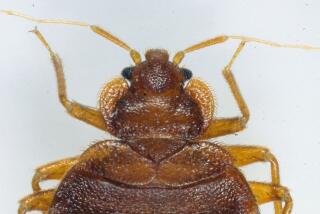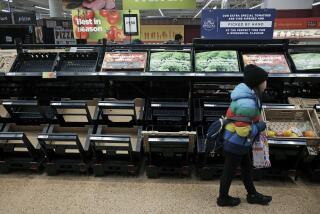Rural Britain Still Feeling Effects of Livestock Disease
- Share via
LONDON — The apocalyptic scenes that scared tourists away from the British countryside last spring--flames licking at mounds of animal carcasses, plumes of smoke dancing above lush hills--have disappeared. But their lasting image continues to damage Britain’s rural tourism industry, particularly in the areas where the foot-and-mouth epidemic hit hardest.
“We’re hurting more than just a little bit,” said Howard Christie, owner of the Wasdale Head Inn in Wast Water, in northwestern England’s Lake District.
Christie said he experienced a 38% decline in revenues in July compared with the same month in a normal year--and that’s an improvement from the nearly 100% year-over-year revenue drop he experienced in March.
The lack of business has forced Christie to lay off five staff members, reduce remaining workers to half pay and take on maintenance tasks normally hired out to local carpenters.
This is the “knock-on” effect, as the British call it, of foot-and-mouth, a highly contagious disease that, though considered harmless to humans, led to the slaughter of more than a million livestock. Despite signs that tourism is picking up in other parts of the country, many people in remote rural areas such as the Lake District’s Cumbria County fear that the worst is yet to come.
“We don’t think we’ll see the full scale of this until Christmas,” said Alan King of the Cumbria Tourist Board.
There is some good news: Cows and sheep in much of Britain now graze in pastures unaffected by foot-and-mouth, and the discovery of new cases is declining.
At the disease’s peak in March, 40 new cases of foot-and-mouth were reported each day, spread throughout 33 counties. Now there are about four a day, according to the Department for the Environment, Food and Rural Affairs, and they are concentrated in just three areas: Cumbria, North Yorkshire and Wales.
Consequently, most hiking paths have reopened and tourists are gradually returning to Britain. In April, 26% fewer overseas tourists came to Britain compared with the same month last year. In June, the drop was 13%, according to the Office of National Statistics.
Still, the dent in tourism may have long-lasting effects. Britain’s rural economy relies on tourism, which is worth four times as much as farming. The government says the eventual cost of foot-and-mouth to Britain’s economy, including tourism, agriculture and related businesses, will be about $3.2 billion.
Tourism accounts for 7% of jobs nationwide. That’s more than the combined number of jobs in software, computers, publishing, music, television, radio, film, advertising, design and the performing arts.
In rural areas, that figure can be even higher. In Cumbria, tourism accounts for 20% of the work force. Officials there fear that more than 40% of these jobs could be lost.
And a loss of jobs isn’t the only economic problem these areas have to contend with. Owners of bed and breakfasts, shops and restaurants supported by tourists in the summer rely on profits generated during that season to carry them through the leaner winter months. But this year, they face a possible double whammy: decreased summer income and the fear that the disease could flare up again.
The unusually warm weather that Britain has experienced lately helps control foot-and-mouth, which is diminished by heat and sunlight. But there’s no saying what will happen come the dark skies and autumn rains.
The British government has responded by giving many businesses a few extra months to pay taxes and bills. The British Tourist Authority has poured nearly $20 million into a marketing campaign aimed at bringing overseas visitors back to the British countryside. Prime Minister Tony Blair has visited regions devastated by the disease.
Some business owners, however, have been critical of the government aid, saying it falls short of the millions of dollars that have been doled out to farmers to compensate them for the loss of their livestock.
“We’re not getting nearly what the farmers are getting, and this whole thing is their fault,” said Andy Stephenson, owner of the Biketreks bicycle rental shop in Ambleside in Cumbria. Business in his shop is down about 40% from last year, he said.
Recent allegations that some farmers are intentionally spreading foot-and-mouth--they can get more compensation for sick animals from the government than they can get for healthy ones at market--add to the bitterness.
When Blair visited Cumbria last month, he was met by farmers and tourist workers alike calling him a “rat” and criticizing the government line that life in the countryside is returning to normal.
“Things have picked up, but it’s a long way from normal,” said King, of the tourist board.
Blair drew further ire when he announced his summer vacation plans. The prime minister had promised to promote rural tourism by spending his family holiday in the British countryside. But, in fact, the Blairs are spending just a few days in Devon, a county in southwestern England hit hard in the early phases of foot-and-mouth, and the rest of the time in Mexico and France.
“The fact is that the British are awful at appreciating their own country and cannot even sell it to their own prime minister,” Simon Jenkins wrote in the Times of London. “No French or Italian politician would need a foot-and-mouth emergency to holiday at home. They would never regard it as a gesture of noblesse oblige, of self-abasement or denial.”
In Devon, businesses are reporting a 15% to 20% drop from last year, according to Nigel Smith of the Devon Marketing Bureau.
He contends that they are suffering more from unfair media hype in the spring than from the current reality. Devon hasn’t had a new case of the disease in several weeks, and trails and parks are open with few restrictions.
But that doesn’t comfort innkeeper Ernie Trimble. His Duchy Guest House in Devon’s Dartmoor National Park had no visitors for eight weeks after foot-and-mouth broke out in February. Since May, he said, his inn has been running at 50% to 70% of normal capacity. To make up for the lost income, Trimble has taken part-time work.
More to Read
Sign up for The Wild
We’ll help you find the best places to hike, bike and run, as well as the perfect silent spots for meditation and yoga.
You may occasionally receive promotional content from the Los Angeles Times.






